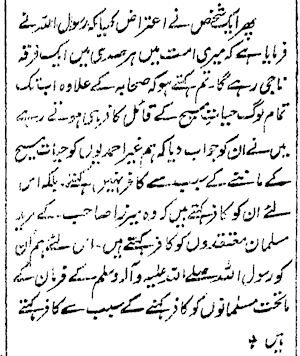Showing Islam is Peaceful • Tolerant • Rational • Inspiring
| Home
|
| 1.
Islam |
| 2.
Ahmadiyya Movement Refuting the Qadiani Beliefs Contradictory positions of Mirza Mahmud Ahmad on calling other Muslims as kafir |
| 3.
Publications & Resources |
Contradictory positions of Mirza Mahmud Ahmad on calling other Muslims as kafirAs we have shown in another article, Mirza Bashir-ud-Din Mahmud Ahmad, second khalifa of the Qadiani Movement, declared all Muslims as unbelievers (kafir) and excluded from Islam, unless they enter into the pledge (bai‘at) formally to become Ahmadis. In his book A’inah-i Sadaqat, published in 1921, which was translated into English and first published in 1924 under the title The Truth about the Split, he has explained at length why he regards other Muslims as kafir. He has quoted extracts from an article he published in April 1911, insisting that in that article, written at a time before he became khalifa of the Qadiani Jama‘at, he clearly expressed and propagated this view. He writes:
He goes on to write that, in his April 1911 article, he had presented the following conclusions::
(Note: His original Urdu article of April 1911 was published in the magazine edited by him, Tashhiz-ul-Azhan. The article can be found in the collection of his writings published in several volumes under the title Anwar-ul-Ulam. It is in v. 1, pages 305–330.) Speech in 1913However, he expressed quite a different view in a speech in 1913. When he returned from performing the Hajj to Makkah, some welcome meetings were held for him in Qadian. One such meeting, attended by Hazrat Maulana Nur-ud-Din, Head of the Ahmadiyya Movement, was held on 14th January 1913. At the request of the gathering Mirza Mahmud Ahmad made a speech about his journey. This event, along with the speech, is reported in Badr, 30 January 1913, pages 17-18. In this speech he mentioned various questions and objections that he encountered from people during the journey and his answers to them. He mentioned one such question and answer as follows:
This statement is quite contrary to his April 1911 article, in which he had argued that “not only are those deemed to be Kafirs, who openly style the Promised Messiah as Kafir”, but all Muslims who “hesitate to enter into his Bai’at … even if they called him a righteous person with their tongues”. His speech of January 1913 shows that Mirza Mahmud Ahmad did not maintain a consistent, principled stand, but rather he expressed whatever belief was suited to the occasion and the audinece that he was addressing. At the Munir Court of InquiryThis was proved again many years later. In January 1954 Mirza Mahmud Ahmad had to appear before a Court of Inquiry set up by the government of Punjab in Pakistan after the anti-Ahmadiyya agitation and riots of 1953. Questioned about his beliefs on this issue, he gave the following answers:
This again is in complete contradiction to his beliefs which he was forcefully declaring in his book The Truth about the Split. It is clear that it was the pressure of circumstances and events that led him to give the above answers. At the Inquiry he was also asked about a statement contained in a speech he made in 1917. In this speech to high school students of his community in Qadian, there is a section headed Differences in religious issues between Ahmadis and non-Ahmadis. Under that heading he had said about other Muslims:
He was asked at the Inquiry the question: “Is this true?” He replied:
Having told his followers in 1917 about other Muslims that “Their Islam and our Islam are different”, a statement which was then published in his own community’s newspaper, he denied before the Inquiry in 1954 that this was his belief. |
